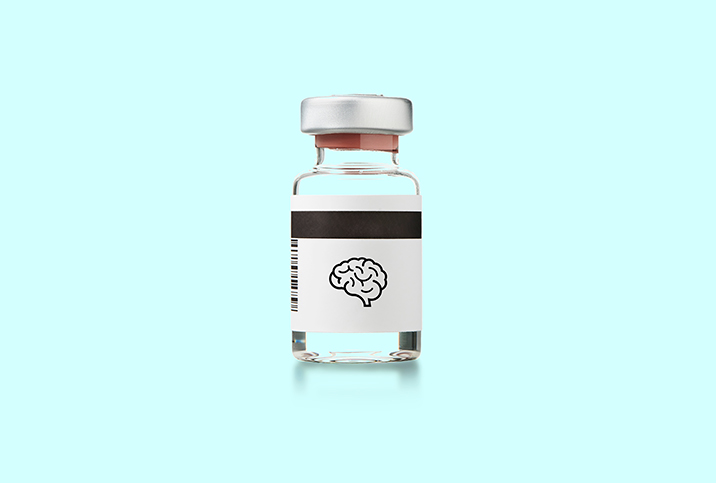What You Need to Know About Treatment for Alzheimer's Disease

Being diagnosed with Alzheimer's disease, a type of dementia, can be a very stressful experience for patients and family members alike. Existing treatment options can help ease symptoms but may come with side effects.
Alzheimer's patients might also suffer from complications such as depression and other mental health concerns, so it's important for family members, caregivers and loved ones to provide encouragement, love and support.
Sexual health is a concern, too, as the disease can affect a person's sex drive. It most often lessens libido, but in some cases, someone with Alzheimer's may show more interest in sex, and when this interest is excessive or obsessive, it's called hypersexuality. These behaviors are not always sexual in nature, however, and can instead represent a lack of comfort or feeling pain, confusion or loneliness.
Treatment from early to late stages
"Up until recently, the only FDA-approved treatments for Alzheimer's were ones to help mitigate symptoms of the disease," said Nicole Purcell, D.O., M.S., a neurologist based in Harrisburg, Pennsylvania, and senior director of clinical practice at the Alzheimer's Association.
Currently, Alzheimer's patients with mild to severe dementia are commonly prescribed two drug classes: cholinesterase inhibitors and glutamate regulators.
Cholinesterase inhibitors generally prevent the breakdown of acetylcholine in the brain, according to the National Institute on Aging (NIA). Acetylcholine is a neurotransmitter that acts as a chemical message, which is released by neurons and allows them to communicate with one another and other specialized cells.
Glutamate inhibitors or glutamate antagonist drugs block the toxic effects associated with excess glutamate. Excessive activation of glutamate receptors may excite nerve cells to their death in a process referred to as "excitotoxicity."
"While these drugs cannot stop the damage Alzheimer's causes to brain cells, they may help lessen or stabilize symptoms for a limited time by affecting certain chemicals involved in carrying messages between the brain's nerve cells," Purcell said.
She added that aducanumab was the first drug approved by the Food and Drug Administration (FDA) to address the underlying biology of Alzheimer's in 2021. The treatment is carried out through infusion while targeting and removing amyloid from the brain.
"Amyloid is one of the hallmarks of Alzheimer's disease, and studies have shown preventing amyloid buildup in the brain may help slow the progression of the disease and preserve cognitive function longer," Purcell said.
The NIA states that before prescribing aducanumab to patients, doctors may require PET (positron emission tomography) scans or an analysis of the patient's cerebrospinal fluid. This is done to evaluate if amyloid deposits are present in the brain. Results from the scans can help doctors make an accurate diagnosis of Alzheimer's disease before prescribing this medication.
"Another anti-amyloid drug, lecanemab, has shown promising results in clinical trials for removing amyloid and slowing the progression of the disease," Purcell said.
In fact, in January 2023, the FDA granted accelerated approval for lecanemab for the treatment of Alzheimer's.
"Both of these treatments [aducanumab and lecanemab] are for use in individuals in the earliest stages of Alzheimer's disease," she added.
The potential costs of treatment
According to Purcell, aducanumab (brand name Aduhelm) can cost as much as $28,200 a year.
"The Centers for Medicare and Medicaid Services has limited insurance coverage to patients in clinical trials, meaning most patients have to cover the cost of the drug on their own," Purcell explained.
Other medications, such as those that help to reduce common Alzheimer's symptoms (like memory loss and confusion) but do not address the underlying biology of the disease, are usually covered by Medicare, Medicaid and private insurance, she added.
"The total lifetime cost of care for someone with dementia is estimated at $371,621," she said.
The possible side effects
According to the NIA, several side effects of Alzheimer's treatments and medication should be noted:
- Aducanumab. This may cause amyloid-related imaging abnormalities (ARIA), which can lead to fluid buildup or bleeding in the brain. It can also result in headache, dizziness, falls, diarrhea and confusion.
- Donepezil (a cholinesterase inhibitor). This may cause nausea, vomiting, diarrhea, muscle cramps, fatigue and weight loss.
- Galantamine (a cholinesterase inhibitor). This may cause nausea, vomiting, diarrhea, decreased appetite, dizziness and headache.
- Memantine (a glutamate regulator). This may cause dizziness, headache, diarrhea, constipation and confusion.
- Rivastigmine (a cholinesterase inhibitor). This may cause nausea, vomiting, diarrhea, weight loss, indigestion and muscle weakness.
Complications related to Alzheimer's
People suffering from Alzheimer's disease may suffer various complications, such as restlessness, bladder and bowel problems, falls, infections, malnutrition, dehydration and depression.
As Alzheimer's progresses, the patient may no longer recognize the sensation of needing to use the bathroom and may become unable to respond quickly to physical urges. Therefore, it's important for caregivers to remind the patient to use the bathroom at certain intervals and to always offer assistance.
The patient's increasing inability to express how they feel might also lead to restlessness and agitation, so it's important for family members or caregivers to be ready to calm them down and reassure them they're in a safe space.
The disease affects balance and coordination, leading to an increased risk of falling. As Alzheimer's worsens, patients also may be unable to eat or drink because of difficulty swallowing, which might result in malnutrition and dehydration, so fluid consumption is important to monitor.
Besides physical health complications, Alzheimer's patients may suffer from mental health illnesses such as depression. According to the Alzheimer's Association, depression is very common among people with Alzheimer's, especially during the early and middle stages.
"[Depression] can be triggered by the trauma of receiving a fatal disease diagnosis, recognition that the person's memory and thinking is getting worse as the disease progresses, loss of independence or feelings of guilt that the person is or will become a burden to their family," Purcell said.
"Identifying depression in someone with Alzheimer's can be difficult since dementia can cause some of the same symptoms," she added.
She noted that common symptoms of both depression and dementia include apathy, loss of interest in activities and hobbies, social withdrawal, trouble concentrating and impaired thinking. If you notice signs of depression in your loved ones who are suffering from Alzheimer's, it is important to bring it up with their primary doctor because properly diagnosing and treating depression can improve the person's sense of well-being.
Aside from medication, lifestyle changes such as exercise, improving diet or sleep, or increased social activity are common treatment options, Purcell said.
Can you prevent Alzheimer's?
Research on how Alzheimer's can be prevented is ongoing. While there are no conclusive answers yet, there are actions you can take, according to the Alzheimer's Association.
A small percentage (less than 1 percent) of people who develop Alzheimer's have an early-onset type associated with genetic mutations. People who have these genetic mutations are guaranteed to develop the disease. Although clinical trials are underway to test if certain antibodies can reduce, delay or prevent Alzheimer's symptoms, there's strong evidence that simply being physically and mentally active and maintaining good heart health can reduce a person's risk.
Some conditions that increase the risk of cardiovascular disease—high blood pressure, diabetes and high cholesterol, for example—also increase the risk of developing Alzheimer's.
Evidence suggests that eating healthy food for the heart can aid in prevention. This means consuming more fruits, vegetables and whole grains while reducing the intake of sugar and saturated fats.
If possible, avoid the risk of head trauma, as there may be a strong link between the future risk of cognitive decline and serious head trauma, especially when the injury involves loss of consciousness.
You may feel reticent, but you can protect your head by wearing a seat belt when you're driving or a helmet when participating in sporting activities—even riding a bike—as well as organizing your home in a way that reduces the risk of falling. Simply making a point to pick things up from the floor can make a lot of difference.
Alternative treatments and prevention methods
Increasingly, especially on social media, people are sharing different types of "natural" remedies and "medical food" with aims to improve health and reduce the risk of certain diseases such as Alzheimer's.
These remedies include consuming herbal remedies and dietary supplements, such as ginkgo biloba, coconut oil, omega-3 fatty acids, coenzyme Q10, or even practicing alternative medicine such as acupuncture.
The hype surrounding these curatives is often based on personal anecdotes shared on social media or passed from one person to another.
But are they really effective?
"Clinical trials have produced mixed results with little evidence to support them as effective treatments," Purcell noted. "There is no current science to show that these treatments can prevent Alzheimer's disease."
However, she acknowledged that treatment is a personal decision.
"If individuals want to pursue these treatments, it's important to consult with their doctor, especially if they are also taking prescription medication," she advised. "Mixing prescription medication with some of these treatments can cause unintended side effects."
Editor's note: These statements have not been evaluated by the Food and Drug Administration. Our medical experts advise that you consult with your primary healthcare provider before you begin using a supplement. This information is not intended to diagnose, treat, cure or prevent disease.


















